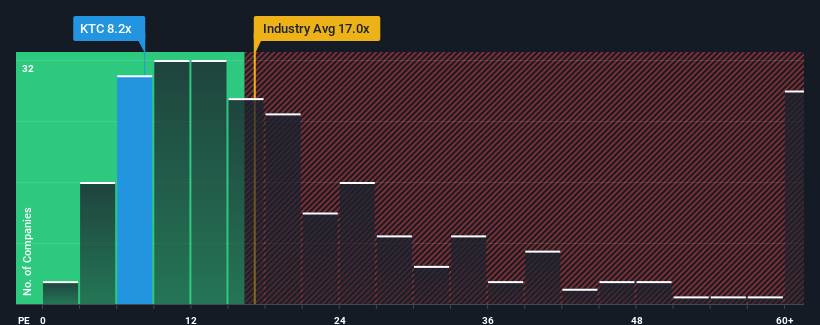- Malaysia
- /
- Food and Staples Retail
- /
- KLSE:KTC
Kim Teck Cheong Consolidated Berhad (KLSE:KTC) Might Not Be As Mispriced As It Looks
Kim Teck Cheong Consolidated Berhad's (KLSE:KTC) price-to-earnings (or "P/E") ratio of 8.2x might make it look like a strong buy right now compared to the market in Malaysia, where around half of the companies have P/E ratios above 18x and even P/E's above 33x are quite common. However, the P/E might be quite low for a reason and it requires further investigation to determine if it's justified.
It looks like earnings growth has deserted Kim Teck Cheong Consolidated Berhad recently, which is not something to boast about. One possibility is that the P/E is low because investors think this benign earnings growth rate will likely underperform the broader market in the near future. If not, then existing shareholders may be feeling optimistic about the future direction of the share price.
See our latest analysis for Kim Teck Cheong Consolidated Berhad

Does Growth Match The Low P/E?
In order to justify its P/E ratio, Kim Teck Cheong Consolidated Berhad would need to produce anemic growth that's substantially trailing the market.
Retrospectively, the last year delivered virtually the same number to the company's bottom line as the year before. Although pleasingly EPS has lifted 363% in aggregate from three years ago, notwithstanding the last 12 months. Accordingly, shareholders would have probably welcomed those medium-term rates of earnings growth.
Comparing that to the market, which is only predicted to deliver 18% growth in the next 12 months, the company's momentum is stronger based on recent medium-term annualised earnings results.
With this information, we find it odd that Kim Teck Cheong Consolidated Berhad is trading at a P/E lower than the market. It looks like most investors are not convinced the company can maintain its recent growth rates.
What We Can Learn From Kim Teck Cheong Consolidated Berhad's P/E?
While the price-to-earnings ratio shouldn't be the defining factor in whether you buy a stock or not, it's quite a capable barometer of earnings expectations.
Our examination of Kim Teck Cheong Consolidated Berhad revealed its three-year earnings trends aren't contributing to its P/E anywhere near as much as we would have predicted, given they look better than current market expectations. There could be some major unobserved threats to earnings preventing the P/E ratio from matching this positive performance. It appears many are indeed anticipating earnings instability, because the persistence of these recent medium-term conditions would normally provide a boost to the share price.
You need to take note of risks, for example - Kim Teck Cheong Consolidated Berhad has 3 warning signs (and 2 which shouldn't be ignored) we think you should know about.
You might be able to find a better investment than Kim Teck Cheong Consolidated Berhad. If you want a selection of possible candidates, check out this free list of interesting companies that trade on a low P/E (but have proven they can grow earnings).
Valuation is complex, but we're here to simplify it.
Discover if Kim Teck Cheong Consolidated Berhad might be undervalued or overvalued with our detailed analysis, featuring fair value estimates, potential risks, dividends, insider trades, and its financial condition.
Access Free AnalysisHave feedback on this article? Concerned about the content? Get in touch with us directly. Alternatively, email editorial-team (at) simplywallst.com.
This article by Simply Wall St is general in nature. We provide commentary based on historical data and analyst forecasts only using an unbiased methodology and our articles are not intended to be financial advice. It does not constitute a recommendation to buy or sell any stock, and does not take account of your objectives, or your financial situation. We aim to bring you long-term focused analysis driven by fundamental data. Note that our analysis may not factor in the latest price-sensitive company announcements or qualitative material. Simply Wall St has no position in any stocks mentioned.
About KLSE:KTC
Kim Teck Cheong Consolidated Berhad
Engages in distribution and warehousing of consumer packaged goods in East Malaysia and Brunei.
Adequate balance sheet and slightly overvalued.
Market Insights
Weekly Picks

Solutions by stc: 34% Upside in Saudi's Digital Transformation Leader


The AI Infrastructure Giant Grows Into Its Valuation
Recently Updated Narratives
Many trends acting at the same time


Engineered for Stability. Positioned for Growth.


Staggered by dilution; positions for growth
Popular Narratives


MicroVision will explode future revenue by 380.37% with a vision towards success


NVDA: Expanding AI Demand Will Drive Major Data Center Investments Through 2026



